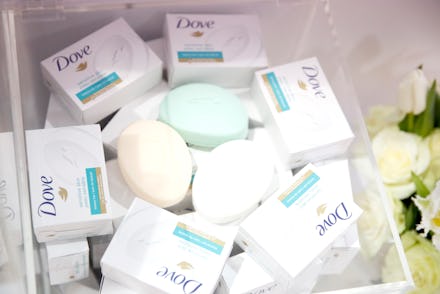Unilever is ditching the word "normal" on their products and I'm (very) cautiously optimistic

We all hate the word “normal,” because it seems to exclude basically everyone even though no one knows what it means. “Normal,” when it comes to beauty products, though, is pretty specific and it implies white, cis-het, and female. “Normal” therefore excludes, well, most humans on the planet. Oh, the irony. Most of us have suspected this for a long time, but now the companies that make beauty products are finally catching on, and beauty product behemoth Unilever announced this week it is removing the word “normal” from its packaging.
I want to be excited about this, but the reality is the entire beauty industry is suffering from Delayed Wokeness Syndrome — and it shows in the polls. The company conducted a worldwide survey of over 10,000 people, and over 50% of them felt excluded by the word “normal,” Insider reported. The same poll showed that 70% of people feel like “normal” has a negative impact on advertising. The people have spoken, and I'm fairly certain that sales are a factor in the company's new decision.
The company also announced that it “will not digitally alter a person’s body shape, size, proportion or skin color in its brand advertising, and will increase the number of advertisements portraying people from diverse groups who are under-represented.” Cool, because Unilever has a pretty notable reputation for keeping oppressive and racist tactics alive for decades (and of course they're not the only ones).
This is a company, after all, that has faced criticism for its skin lightening products and racist advertising practices, and the company recently faced an investigation for ethnic violence against workers at one of its tea plantations in Kenya. So, this particular packaging move is a win, but it also seems like Unilever is pretty inconsistent in its commitment to social justice. Perhaps we can figure out how to remain hopeful (or cautiously optimistic) about a turning of the tides for Unilever and every single other company out there like it.
"We know that removing 'normal' alone will not fix the problem, but we believe it is an important step towards a more inclusive definition of beauty," president of Unilever's beauty and personal care division, Sunny Jain, told Reuters.
This seemingly progressive move is necessary, but their announcement is a little self-congratulatory for my taste. And also, if grooming product companies can no longer use normality as an aspirational beauty standard, they will likely try to find whole new ways to make us feel shitty in order to sell us their goop. The best case scenario here is that all the Unilevers out there start to realize that using inclusive marketing and boosting our collective self-esteem is not just the more profitable thing to do — it's the right thing to do.